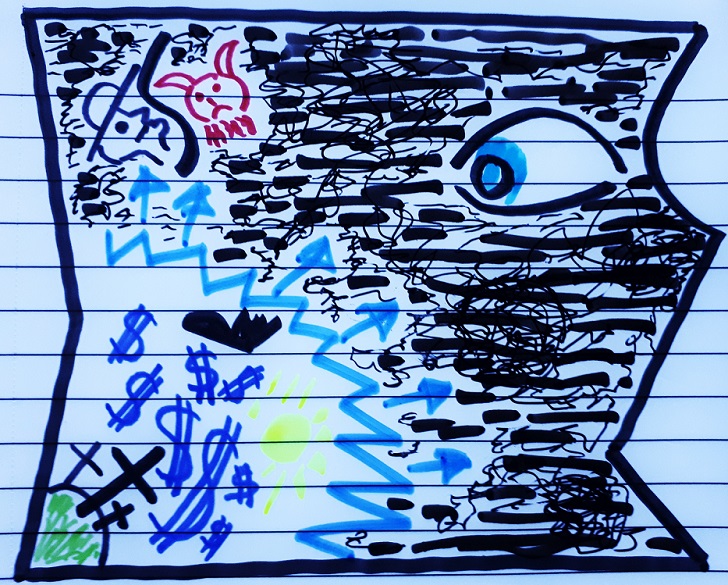How to grasp a 5 million year moment for species “Homo”?
FEATURED: A modern Faust.
Pieter Bruegel the Elder (1525-69) 1563, detail from Dulle Griet (Mad Meg). Oil on panel, 115 cm × 161 cm, Museum Mayer van den Bergh, Antwerp
COMMENT: a visual metaphor for Modernity? Remorseless, unstoppable, robotically fanatical, sans sentiment in confronting, swallowing Tradition?
If a man will begin with certainties he shall end in doubts; but if he will be content to begin with doubts he shall end in certainties (Francis Bacon (1561-1626), ie the certainty of uncertainty.
The humanist has four leading characteristics – curiosity, a free mind, belief in good taste, and belief in the human race. English writer, EM Forster (1879-1970). Not a bad checklist.
The liberal “West”? Very much alive.
Yes the old liberal “West” has “problems”, and always will, coping with:
- adjustment from never ending economic and technological change,
- dissent from within from its own fractious reactionary elements, hostage to the Siren-call of Tradition.
- and reactionary states – run by conflicted elites – hostile to the liberal-democratic model, like China, Russia etc.
While the model is called “Western” that only refers to its origins. Like quantum physics and other scientific constructs the precepts are now relevant universally.
But the liberal heart is still beating, and remains inherently strong, sustained simply, ultimately, by popular appetite for democracy and freedom.
So at least it’s backing the winning team, ie listening to voters who can access a rules based competitive liberal democratic system.
And the reactionary authoritarian states will keep paying a price for their misguided loyalty to tradition,not least economically.
The cork is out of the bottle – freedom is loosed, abroad – and will never go back.
People wonder why Modernity’s obvious success (material, health, freedom) has not left people generally happier. “Tradition” left people poor and powerless but its slower pace and comfortable (if illusonal) “ideological”certainties appealed to many, especially now in hindsight as bad memories of it faded.
So Modernity’s biggest single challenge in seeing off “tradition” is enabling people to still find “spiritual” meaning or purpose.
The return of Empire? No. No match for “Modernity”.
Mr Kaplan (1) got Iraq wrong (but kept good company in so doing), and it now seems likely he’s dead wrong again, in his The Return of Marco Polo’s World (Robert D. Kaplan Random House,2018). James Traub reviewed him in the WSJ (March 2018) headlining thus: “Empires Strike Back. A combination of state failure, globalization and technological change has eroded state sovereignty and begun to restore an older world.”
Mr Kaplan is right to discern nostalgic / reactionary “Imperial” inclinations in countries like.. Iran, Russia and China.
But end of the day they are all losers, on the wrong side of history, resisting, recoiling from Modernity, from the rational open-eyed free thinking liberal democratic model.
It’s costing them, and will keep costing them.
Note:1. Return of Marco Polo’s World’ Review: The Empires Strike Back. A combination of state failure, globalization and technological change has eroded state sovereignty and begun to restore an older world. By James Traub March 5, 2018 WSJ. And 9 march 2018. The Return of Marco Polo’s World By Robert D. Kaplan Random House, 280 pages, $28
China? Paying a price for not liberalising.
The prognosis for “Communist” China is complex, other than to say, whatever economic progress to date, its failure to liberalise is costing them..
Many are pessimistic for China’s economy (like Carl Minzner, “End of an Era: How China’s Authoritarian Revival Is Undermining Its Rise”, 2018). But China meanwhile has marched on, confounding many “experts”, apparently still growing at well over 5% pa, and now off a much larger base.
It is certainly authoritarian / autocratic, but the regime does remain strongly focussed on (now cleaner) economic growth, doing what it can to foster this. Rationally they understand the economic value of “Western” liberal practices like competitive markets and rule of law, see how well it works in Chinese flavoured jurisdictions like Taiwan and Singapore, where Chinese people are economically incentivised.
So they’re trying to have best of both worlds, to keep a lid on people’s democratic aspirations but grow the economy. So within the constraints of an authoritarian political system they do what they can to encourage a positive economic outcome, through promoting foreign trade, infrastructure and innovation, and also (notwithstanding obvious constraints) “rule of law”.
The contrast with its large western and also authoritarian neighbour Russia could hardly be sharper.
But end of the day contradictions abound.
Stepping right back, the blunt and unhappy reality for China – or rather its “Communist” leadership – is that they are a nostalgic reactionary cast, out of step with the remorseless march of Modernity.
The illiberal authoritarian system will inevitably mean a poorer economic result than otherwise. So end of the day “Communist” China will pay a price for not liberalising, economic and political.
And who cares recently if Mr Xi stays there indefinitely? It’s the same authoritarian system, and not as if his successor would be in any way voted by the people. And who cares if Mr Xi wants to promote his alternative model. Who else wants it? Look what autocracy is doing for economic miracles like Russia and Iran.
It’s called “Communist”, referring back to Lenin, Marx, Socialism etc, but that’s just a useful ideological construct to support a rigidly authoritarian system which sees itself far more as Chinese than working for grand dreams of a son of Trier.
And other “Empires” like Russia? Paying an even bigger price.
Russia and Iran are both paying a high economic price for their belligerent thuggish, corrupt, reactionary kleptocracies, much higher than China, which is at least giving economic progress some priority.
The wider debate: whereto Modernity? The improbable 5 million year moment for species “homo”.
The topic goes to the heart of the biggest global polico-economic question of all today: the fate of Modernity in the modern world, child of the Enlightenment Project.
This goes to the contest between the competitive liberal-democratic (LD) model – which is the basic organisational framework of Modernity – versus the long running traditional authoritarian model, where a ruling group, clique, caste, rules the common masses, through:
1/ a self-serving supportive validating ideology / mythology, especially traditionally, religion, and later nationalism, especially post the French Revolution, ie after the Church and traditional monarchies were finally sidelined, and authoritarian governments then appealed to their own ethnic culture/history for legitimacy.
Both models, religious and secular, take advantage of profound popular appetite for “spiritual” sustenance.
And 2/ force, security forces: enlisted and paid enough, to repel dissenters.
Meanwhile, after a long and bitter and violent gestation, across 3 centuries, seeing off strenuously reactionary foes (especially religious, then including supporters of slavery and imperialism, and visceral nationalism), at great cost (like the 30 Years War, the Napoleonic Wars, then not one but two world wars), the LD model is now out of the bag and established in the “West”, in Europe whence it emerged, and in Europe’s offshoot the US, but now, post WW2, in other parts too, in parts of Asia and South America.
The LD model has been hugely successful, in three respects (eg refer to host of relevant books, lately like “Enlightenment Now: A Manifesto for Science, Reason, Humanism, and Progress”, Steven Pinker, 2018, Allen Lane):
1/ in politics, allowing meaningful full franchise democratic political freedoms, also great strides in human rights .
2/ the economy. Freedom is powerfully effective economic medicine, through harnessing Man’s creative abilities, in a collective competitive system, overseen, managed by democratic governments.
And 3/ health outcomes, with dramatic boost in longevity.
Manged competition among economic agents is perhaps the single key driver of economic progress, as it was for the success of post Bronze Age classical Greece..
The comparative economic experience of the two systems evident in divided Germany, in China and Korea illustrates the difference starkly.
Modernity is a dramatic and unparalleled state of affairs. The last few centuries, continuing fiercely now, is a 5 millon year moment for species Homo.
So it’s no wonder a species which has been evolving that long may have trouble adjusting to such a sudden and drastic change in affairs.
Yes there are “problems”. There always are.
The outcome is never perfect, is always sub-optimal, especially coping with:
1/ adjustment from never ending economic change the inherent processes of “creative destruction”,
2/ and reactionary dissent, sometimes exploiting popular appetite for “tradition”, “meaning in life”.
So yes there is now opposition, resistance:
- Yes from states outside, notably from China, not least for its size, and also Russia, Iran
- And from within LD states too, reactionary forces, citing tradition. Yes religious and nationalistic.
- And there is always (criminal) opposition from Bad People.
Modernity’s Faustian deal brings its biggest challenge? Answering life “purpose”.
Modernity’s biggest single challenge in seeing off, fighting off “tradition” and its ardent proponents is enabling people to still find “spiritual” meaning or purpose.
“Tradition”in one guise or another supplies easy spiritual moorings, the simple encompassing (if delusional) spiritual “quick fix”, usually or typically religious but also for many simply loyalty to some notion of human group: community, tribe, nation, communing with home-land and ancestors one way or another, formally and informally.
Anti-liberal states, institutional religions, and nefarious charlatans all, exploit for their own ends these ready DIY spiritual answers to pervasive curiosity about the circumstances of existence.
Modernity’s millstone is that it upends easy existential answers.
The door to Modernity brings Man to the Faustian turnstiles, to Man’s modern grand Faustian predicament: he trades “spiritual certainty” for freedom!
Freedom brings extraordinary knowledge, opportunities, material abundance, antibiotics, but the price of this knowledge, at least for the open-eyed, diligent and intellectually honest is – paradoxically – uncertainty! The price is profound mystery, awareness of the limits of knowledge, and thus surrendering the certainty offered by Man’s spiritual sand castles, surrendering submission to some seductive carefully human fabricated. self-serving, but delusional belief system, whether based on religion or or community and location (nationalism etc).
Man is left living with mystery, however exquisite, tantalising.
It’s an important reason many people still “worry”, apparently “irrationally”, despite the extraordinary progress – economic and political – loudly recorded by writers like Steven Pinker.
BERT: Bill’s Eternal Ripple Theory
But there is a curious possibility,perhaps awaiting a Nobel Prize to help confirm.
Every life, short or long, high or low, accumulates manifold thoughts and actions, which may echo, ripple`forever after, somehow,somewhere.
Leave some manner of footprint.
So we may live on after all, in some infinitesimal way.
Meanwhile the cork is out of the bottle, for good.
End of the day, EOD, there is strong popular, universal, appetite for rules-based “democracy”, for responsibly discharged freedom.
Arguably too this is now reinforced especially by increasing education, globally, everywhere, opening eyes, which, importantly, chips away at the appeal of traditional authority.
Education is a problem for states hostile to liberal democracy. Thus success in a modern economy means having educated, literate workers, but such education will only open popular eyes to liberal-democracy.
The cork is out of the bottle – freedom is loosed, abroad – and will never go back.
Though the practical task of keeping the LD model in shape never ceases, educating the next generation and fighting off multiple antagonists.
The reactionary states, where ruling elites reject the LD model out of power and financial self-interest, are not immune to the “disease” of freedom:
- They have to cope with dissent triggered by popular democratic aspirations,
- and they will pay a big ongoing economic price for suppressing it.


